
Use Other Platforms
As I tried for many years to optimize arahova-pansion.gr and make it a recognizable brand, I saw a range of approaches by other professionals in the accommodation sector regarding their online presence that sometimes impressed me greatly.
The most savvy and major players in the area (entrepreneurs) active in the tourism industry around Arachova (accommodation, catering, services, etc.) almost all had their own website.
Of these, few had done even the very basic steps described so far.
Most had simply a “static website (not fresh and dynamic content) that just functions and some communicate through it.”
There were also some without their own website.
These either had presence on platforms like Booking.com, Tripadvisor.com, Google My Business, Facebook.com, etc., or simple listings on some business directory sites. Or had no online presence at all.
The best example for me was the Apollon Inn hotel in Arachova, one of the oldest and central hotels, which had listings and presence on Booking.com, Booked.net, Google My Business, Tripadvisor, filoxeno.gr, trivago.com, Vrisko, Chrysos Odigos, Hotelsline.gr, and many external platforms but no own website: it operated solely through third parties and its online presence was exhausted on other sites.
Image 11.1: Search results for Apollon Inn, hotel in Arachova. All mentions are on external sites and platforms like Booking.com, Google My Business, etc.

At some point in this optimization journey of Arahova Pansion’s site, seeing these two groups of people above, I wondered which is the best approach.
Also, I wondered if I with the Arahova Pansion site truly have the most efficient approach: maybe the time and money—energy—I spend there I could dedicate somewhere else and simply have a presence—for example—on Booking.com, and only from there handle the business? Or is what I was devoutly following better?
The answer is not simple but can be summed up in one word.
Depends!
There are several reasons why the website is a better and more professional approach for an online business presence. These reasons summarized are the following.
- A website builds trust and credibility.
Have you ever googled a business and the only thing representing it was a Facebook page with 35 likes? Even if you have, I guess you never interacted with such businesses (bought from or collaborated).
A good website costs time and money.
And if someone is willing to invest money in their business, then it must be something they believe in, which means others may also believe in it. - A website is better for SEO.
No matter how incredible content you make on platforms like Instagram and Booking, if you post only on social media and other platforms, search engines barely know it exists.
This means you lose the chance to connect with millions of people searching for answers via Google Search. - A website contains all your important info with proper structure.
No matter how good a platform is, it’s almost certain often information won’t be available when needed to those seeking it.
Most tools and platforms where a business can appear are designed to adequately serve a huge number of businesses with varied needs and so have limited flexibility.
The same applies even more to social media, whose post display algorithms you cannot control or influence. - You own your website.
Content on social media and other platforms isn’t yours. So, you don’t have full control over it.
You must always comply with their terms; if the company deems you incompatible, they may delete you instantly.
Also, if they decide to change rules or shut down entirely, you are left stranded. All your efforts, energy, and possibly money are lost (remember Google Plus).
With your own site, you have full control and chiefly ownership; anything you build there (e.g., client lists, visitors, customers) stays yours (or until you choose to end it).
Thus, for someone who prefers a more complete, proper, and professional presence, an owned website is the answer.
However, many don’t have time, money, or energy to invest in creating and running a proper website.
In these cases, using other platforms can be a solution, either permanent or temporary, to prepare the ground for a new owned website presence.
In the early internet days, building a website required advanced programming skills and hours of hard work.
But within a few years, platforms like Geocities made website creation easier.
In April 2009, Yahoo announced it would stop new Geocities signups and later said the service would close on October 26, 2009.
All Geocities pages were deleted on October 23, 2009.
Geocities stopped, but history repeats.
From Geocities, we moved to the era of WordPress, MySpace, and Facebook.
Since 2003, WordPress has empowered anyone with internet and a personal computer to manage content user-friendly.
Soon after, MySpace, the first social networking platform with significant global share, let people create their personal pages, with memorable URLs and large visitor audiences.
Over time, most MySpace users migrated to Facebook, joined by millions who never knew “social media” before.
Today, Facebook has nearly 3 billion monthly active users worldwide, making it an excellent place for businesses to engage potential customers.
Facebook Pages, launched in 2007 to promote brands and businesses, made many think company sites would soon become obsolete.
While about 80% of U.S. businesses today use Facebook for marketing, the need for an official brand website remains.
Facebook is big, but what applies to it applies to similar platforms where a person, business, or entity can have a presence.
Every vertical business sector today likely has a corresponding platform like Facebook with dominant players.
For example, in Greek ecommerce, the leader is Skroutz.gr.
Almost everyone knows it, and when they want to buy, visit millions of Skroutz pages, decide, and purchase.
A merchant, with or without a web store, can register on Skroutz and start selling products in moments.
Globally, Amazon and eBay dominate ecommerce in many countries.
In tourism accommodation, global leaders are Booking.com, Airbnb.com, Expedia.com, Hotels.com, Tripadvisor.com, and Agoda.com.
A small (or large) hotel can register on these platforms and sell stays.
A small artisan making handmade products can register on Etsy.com and find a global audience for their creations.
Regarding used car trading?
In Greece, a dealer not listed on Car.gr is unimaginable, as almost all buyers visit it for research.
Almost everything today likely has a corresponding platform.
Alongside successful sites in a sector, there is Google My Business.
Google My Business registers businesses with physical presence and shows them on Google Maps.
Today, Google My Business is essential for a physical business; it’s unimaginable not to be listed.
Image 11.2: Business presence on Google My Business.
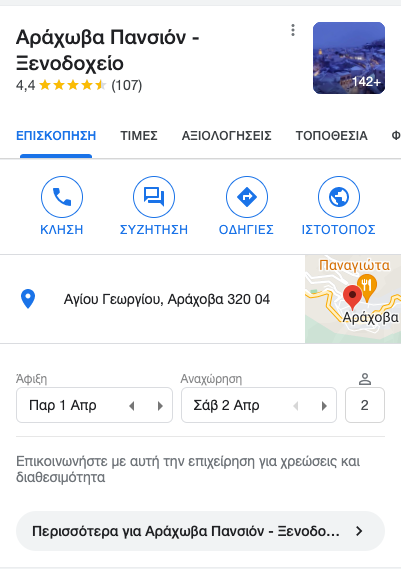
Finally, there is Facebook, the number 1 social medium today, plus many other social media with different targets, almost all offering services very useful (and often the exclusive source) for business efforts.
Some of the most popular social media platforms are:
- Facebook, 2.9 billion monthly users
- YouTube, 2.2 billion monthly users
- WhatsApp, 2 billion monthly users
- Instagram, 2 billion monthly users
- Facebook Messenger, 1.3 billion monthly users
- WeChat, 1.2 billion monthly users
- TikTok, 1 billion monthly users
- Pinterest, 400 million monthly users
- Twitter, 330 million monthly users
- LinkedIn, 300 million monthly users
On nearly all above platforms, one can add content in various forms, videos, images, messages, ads, and posts using their tools.
These apps are designed to keep users within their own ecosystems.
Platform developers like those earlier mentioned work hard to create a pleasant user experience but don’t share the same goals as individual business owners.
Their goal is to keep users in platform-hosted channels to collect more personal data and serve more paid ads and sales.
You and these companies have different missions; using a Facebook page instead of a corporate site limits your focus on real conversion goals.
One reason some business owners consider such platforms, like Facebook pages and Booking.com, instead of a corporate site is the perception that setup is easier.
It’s true these platforms make page creation relatively simple, guiding you step by step (equally true if you use a site builder like WordPress.com).
Existing platform users can create a page quickly; customization can be harder for beginners unfamiliar with it.
Navigation on most (if not all) tools is standardized. While you can usually reorder elements shown, you don’t control page locations or titles.
Regarding layout, some options exist but are usually limited.
Regarding content, on such external platform pages you might pin important content at page top but lack full control.
Creating a Facebook page, for example, you can enter basic info such as:
- Business Name
- Description
- Contact details
- Company history
Afterwards, you can upload images, photos, and posts related to your services. This is fast with a user-friendly interface, familiar if you have a personal Facebook profile.
Images and info you upload to Facebook (similar terms apply to most channels) technically belong to you, but once published, you agree others can share and redistribute your content.
Websites, on the other hand, let you keep 100% ownership of content. No gray areas or blurred lines.
Publishing a product photo on your site doesn’t grant others public use except explicitly allowed.
Customers might share your site content, but you have stronger protections against misuse.
However, the main reason businesses join platforms like Facebook, Skroutz, Google My Business, etc., is their massive user base.
With billions flocking to Facebook, it’s easy to assume presence there connects your business to potential customers, and it’s true. All social platforms offer opportunities to connect with new people.
One of my favorite examples of Facebook’s huge user pool use is the page “Geography is Very Cool,” which—true to its name—posts interesting geography content.
The page started August 2019 but grew enormously during the first coronavirus lockdown (March 2020) when most sought pleasant ways to pass time while confined.
I, like many, found it via a friend’s Facebook share, explored and enjoyed learning info in a fun, entertaining way with fun facts, so I followed and frequently saw its posts on my timeline.
Today it has about 350,000 followers and nearly the same number likes it.
Truly a big achievement for its admin.
Image 11.3: The “Geography is Very Cool” Facebook page.

It was clear to me the admin started the page from a love of geography and hobby; its huge success doesn’t surprise me: creating content with passion and an almost inexhaustible audience tips the odds in your favor. Often success is a matter of time.
Of course, as success and following grow, so do demands, expectations, and often the creator’s interest in monetizing success—making money.
With 350k followers, it was natural for “Geography is Very Cool” to seek financial benefit.
One important step was publishing two geography books, advertised via the Facebook page: “Geography Is Very Cool!, Activity Book for Adults” and “Geography for the Completely Un-geographed,” available in bookstores and online stores.
Image 11.4: Books of “Geography is Very Cool” page on Skroutz.gr.
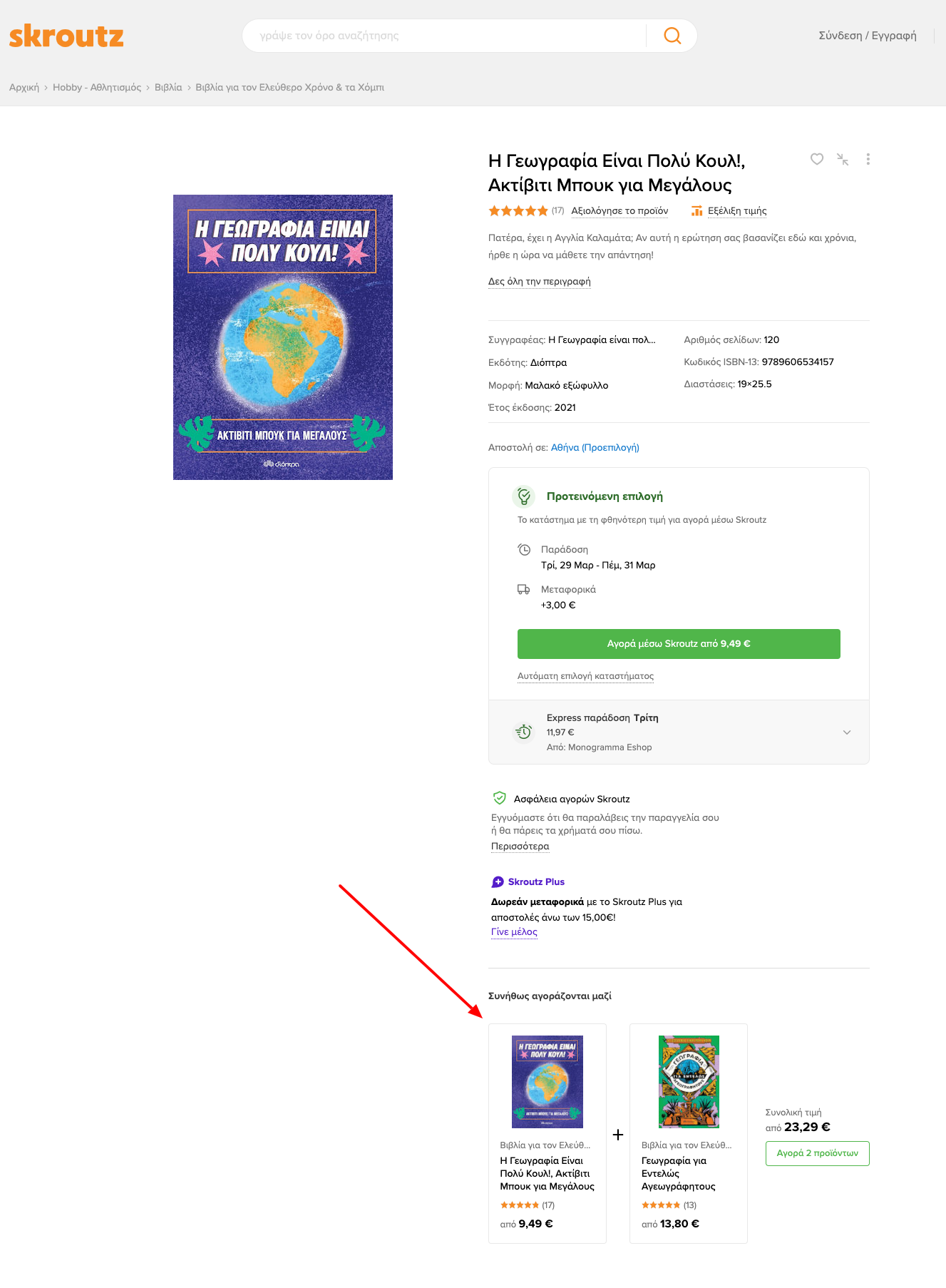
But there was no owned personal or corporate site to buy the books, find author info, learn about the Facebook group, etc.
A Google search for “geography is very cool” shows results from the book publisher, Facebook page, Skroutz.gr book pages, etc.
To get group history, admin info, find old or new books, learn about new projects, or contact the author, one must navigate external unofficial links.
Image 11.5: Google results for “Geography is Very Cool.”
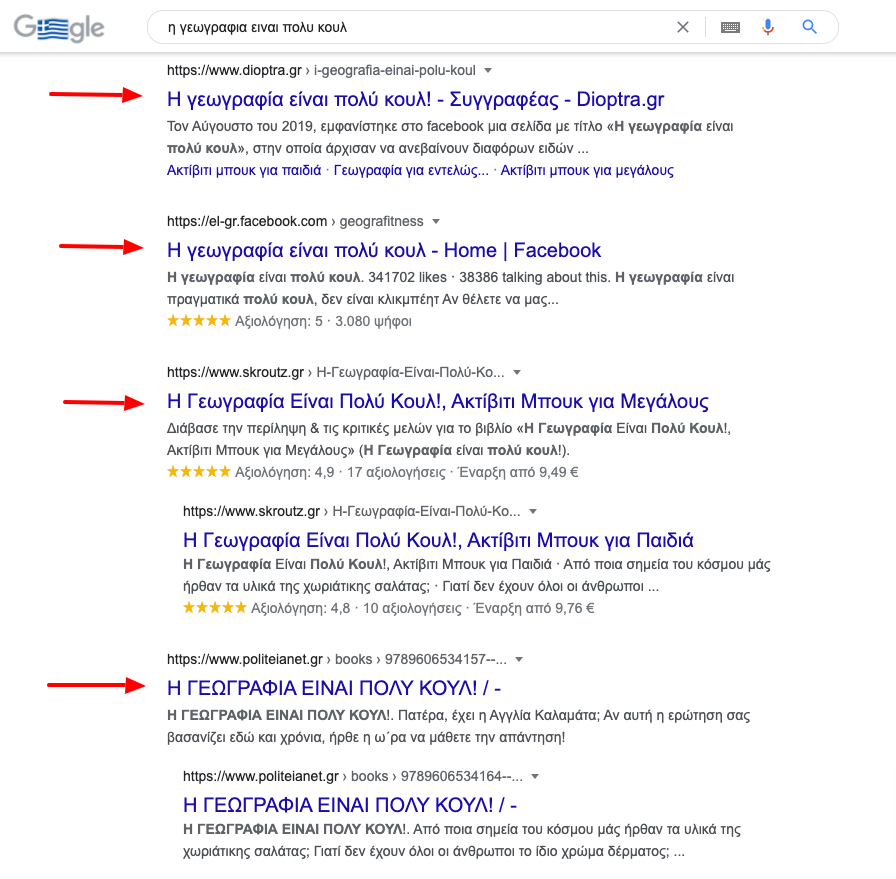
This is not easy!
Personally, I searched group info and early posts, couldn’t find them on Facebook.
For me, even after success and business shift, it’s still a somewhat anonymous, amateur “Facebook page.”
If I were admin, I’d soon put my info on an owned, optimized site aligned with my business goals.
The same applies to Skroutz for Greek online shopping or Booking.com for accommodation services. Millions use these platforms daily to fulfill needs.
Let’s see some pages on Skroutz Marketplace, a service where Skroutz covers costs and daily tasks requiring time and effort from merchants lacking time or energy to build and maintain their own eshop.
Stores just add products and accept orders.
Skroutz handles shipping, cancellations, returns, customer support, secure payments, and provides access to 9 million users to sell products.
The Skroutz page “Stories Behind the Button” (merchants.skroutz.gr/merchants/partnerstories) presents merchant stories that inspire others.
Image 11.6: Skroutz page with successful merchants who grew their businesses using Skroutz.
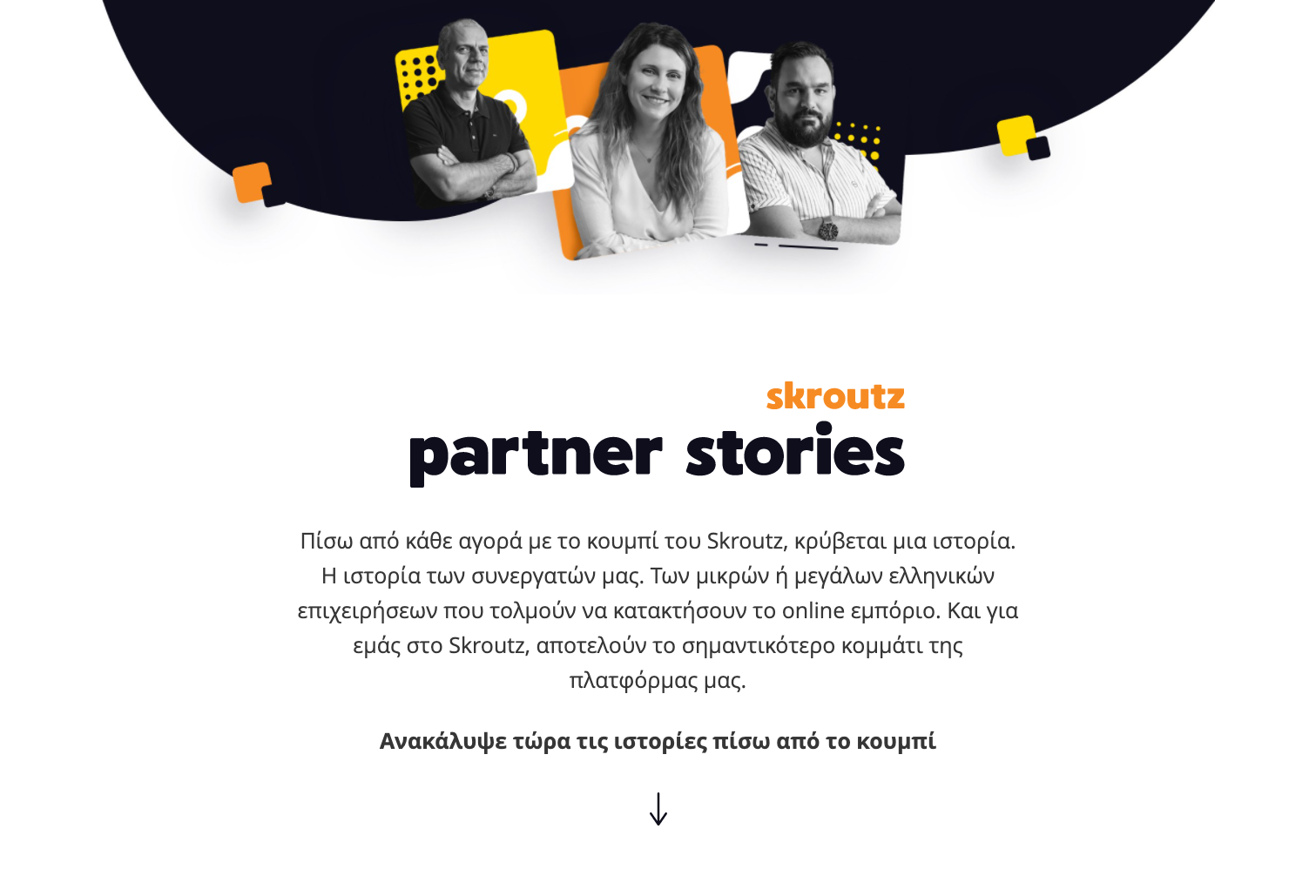
Like Akis Painesakis from Chania and Italian Factory Outlet; though he conquered fashion with 6 stores, he lacked something important: online presence. Thanks to Skroutz, his store sales soared beyond expectations.
Or Irini Konstantinou from Andros continuing family business 32 years on. Joining Skroutz transformed two small seasonal stores into a successful year-round online business.
Spyros Rapti, after 13 years in catering as waiter, barman, and bar manager, wanted his own professional path. In 2017, he began his dream with a wholesale drink warehouse and van. Six months later, opened QAVAR, a small retail store specializing in rare premium drinks. When lockdown hit and hospitality closed, his turnover dropped to near zero. He knew to survive he had to move products online via Skroutz. Joining Skroutz marketplace, Spyros not only boosted sales sharply but studied competition and consumer preferences, discovering cheaper suppliers and predicting drink trends. He expanded beyond his region to northern and southern Athens suburbs with premium drinks interest. Today, with 3,500 active products on skroutz.gr, he dreams of an even stronger business future.
Or Angelos Tsarouhas and brothers, MG PLUS owners, popular youth fashion in Athens center. After years trying online commerce, they used Skroutz for online sales. “Since joining Skroutz phones haven’t stopped ringing. It was like advertising. Customers saw our products on Skroutz and came to our stores,” says Angelos, with 2,500+ products on Skroutz and online sales making 25% of daily sales.
I have chosen an intermediate approach for Arahova Pansion.
Given commissions for Booking, Airbnb, Expedia, etc., start at 15%, I maintain and strengthen the website presence to save commissions.
The more direct bookings from arahova-pansion.gr, the more money I save otherwise paid to Booking.com, etc. Those savings I reinvest in activities that grow arahova-pansion.gr, bringing more commission-free bookings.
Today, most bookings at Arahova Pansion come through its official site.
Image 11.7: Booking channels for Arahova Pansion. Most bookings come via the company’s official website.
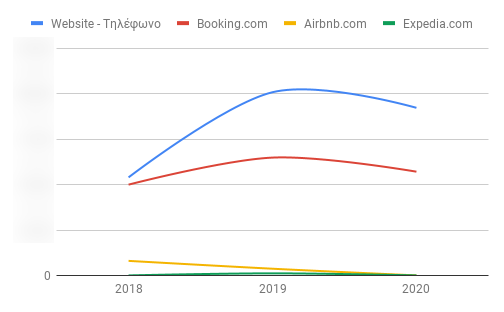
Do you know which site has more users than Facebook, Booking, Skroutz?
Google itself.
And what connects Google users? Websites.
Since January 2019, Google handled a commanding 89.95% of all web searches.
To have a strong business presence on Google, you need (besides a real website) a Google My Business profile.
Of course, social media and platforms like Booking and Tripadvisor can be hard to find on Google search. Their vague URL structure and competition between Google and those companies limit your chance to rank on the first page with a profile there.
A drawback of external platforms is lack of control over public discussion.
Today this is harder than years ago because open online forums are designed to give everyone a voice.
This transparency is good but causes problems when unfair or false statements appear.
Users rate brands and businesses on these platforms, reviewing service levels. Reviews have benefits but can also cause headaches.
When a happy customer writes a glowing review, it’s an opportunity for others to see your great service.
Negative reviews deter clients but it’s not always easy to defend against false claims.
Previously a concern was that reviews might be posted by someone who never used your products or services (e.g., a competitor). Many platforms now have safeguards offering some protection, though not absolute.
For example, on Booking.com, which allows reviews only from customers who booked the hotel, I could book a competitor’s place and post a negative review to deter customers hoping they pick Arahova Pansion instead.
The biggest problem is you cannot remove a negative review once posted on an external platform, no matter how false.
Such misinformation can cause dozens or hundreds of lost customers.
As a small business owner, it’s in your interest to leverage every opportunity to reach customers.
One such is using business listings—online directories—focused on local search and customer reviews.
When customers nearby search your product or service types, the first place they turn to is the web.
In fact, nearly half (46%) of all Google searches seek local info.
Big platforms active in a sector will always appear among top results for these searches.
Having a presence there is the best you can do after creating and optimizing your own website.
Let’s look at a few.
Google My Business
When customers know nothing else online, they know Google.
Besides, the search platform holds over 90% market share in most Western countries.
Image 11.8: Google My Business logo.
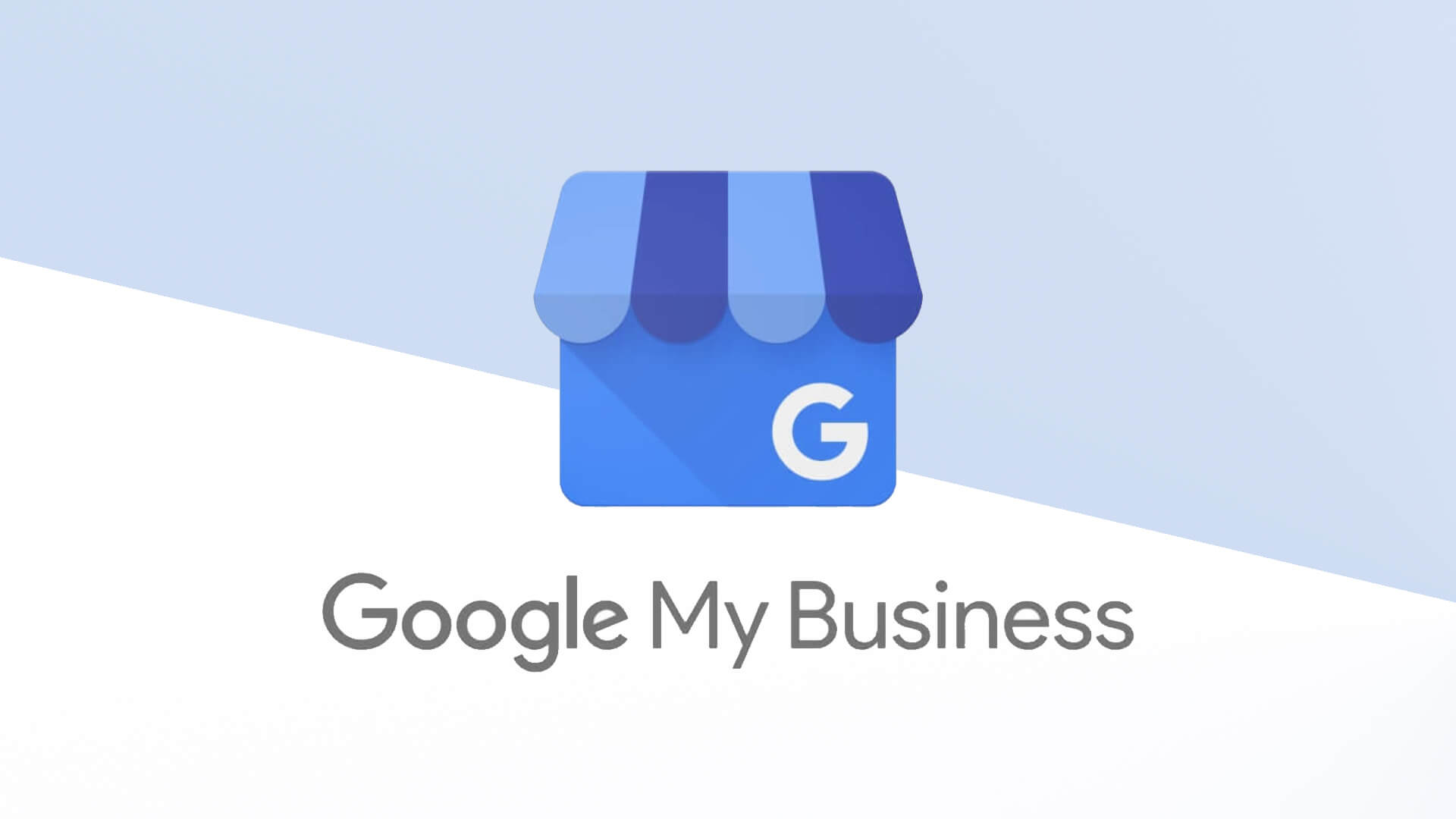
But how is Google as a local small business directory?
First, Google is a well-known (and trusted) brand. Everyone uses Google to find needed info.
So, listing your business on Google is critical. The higher you appear, the better.
You can create a free business profile via Google My Business (GMB), Google’s business directory tool.
Google My Business plays well by integrating with other Google consumer-centered products—search and maps.
Whether customers search a business in their search bar or maps app, you can easily show up with a GMB professional profile.
With such organic reach, Google can drive lots of virtual and physical traffic to your business.
GMB focuses on local SEO, so most seekers finding your business are nearby.
Also, local customers searching your business type nearby tend to be ready to buy.
All these factors make it more likely those who find you on GMB convert to real customers.
Sometimes your business might not appear in user search results even if related.
For most, Facebook has name recognition equal to Google.
Be where your customers are—an old adage still true today.
Stats show Facebook is popular and many customers likely use it. Creating a free Facebook Business page helps reach them.
Image 11.9: Meta for Business logo.
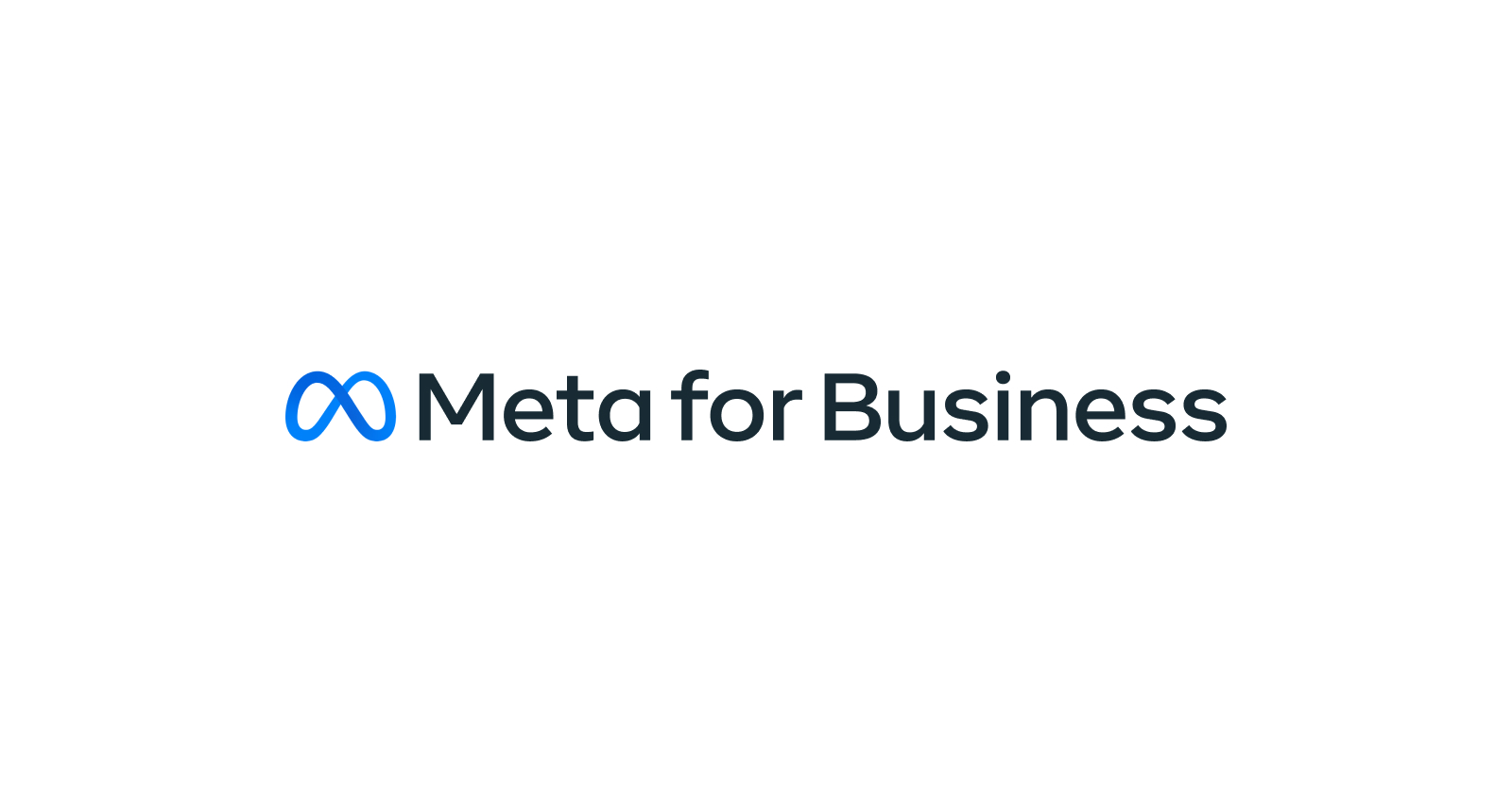
Using Facebook as a business directory helps reach and interact with customers.
Remember Facebook is a social platform designed for engagement.
You can share posts, interact in post comments, reply to direct messages—all to promote relations with prospects and customers.
If you hope for much organic traffic, Facebook may not help much.
Its algorithms tend to limit who sees your posts—unless you pay to boost.
You can spend money boosting posts to increase views.
So the question is whether you have the budget for such support.
We mentioned engagement, but it has a downside.
Social media sometimes inspires negativity more than face-to-face or phone talks. If careless, people could misinterpret comments and get offended, harming your business perception and that of others seeing the conversation.
Skroutz.gr - eCommerce
When Greeks think of buying something, they probably visit Skroutz.gr to research, decide, and buy.
Skroutz’s main advantages are its huge visitor base—over 1 million daily—and great user experience plus amazing content.
Registering takes only a few clicks with or without an existing store. Skroutz handles all steps to get products to buyers.
Management is easy even for business owners with little computer or internet know-how.
Skroutz handles cancellations, returns, customer support, covers shipping and banking costs, and ensures secure payments.
Image 11.10: Skroutz Merchants homepage.
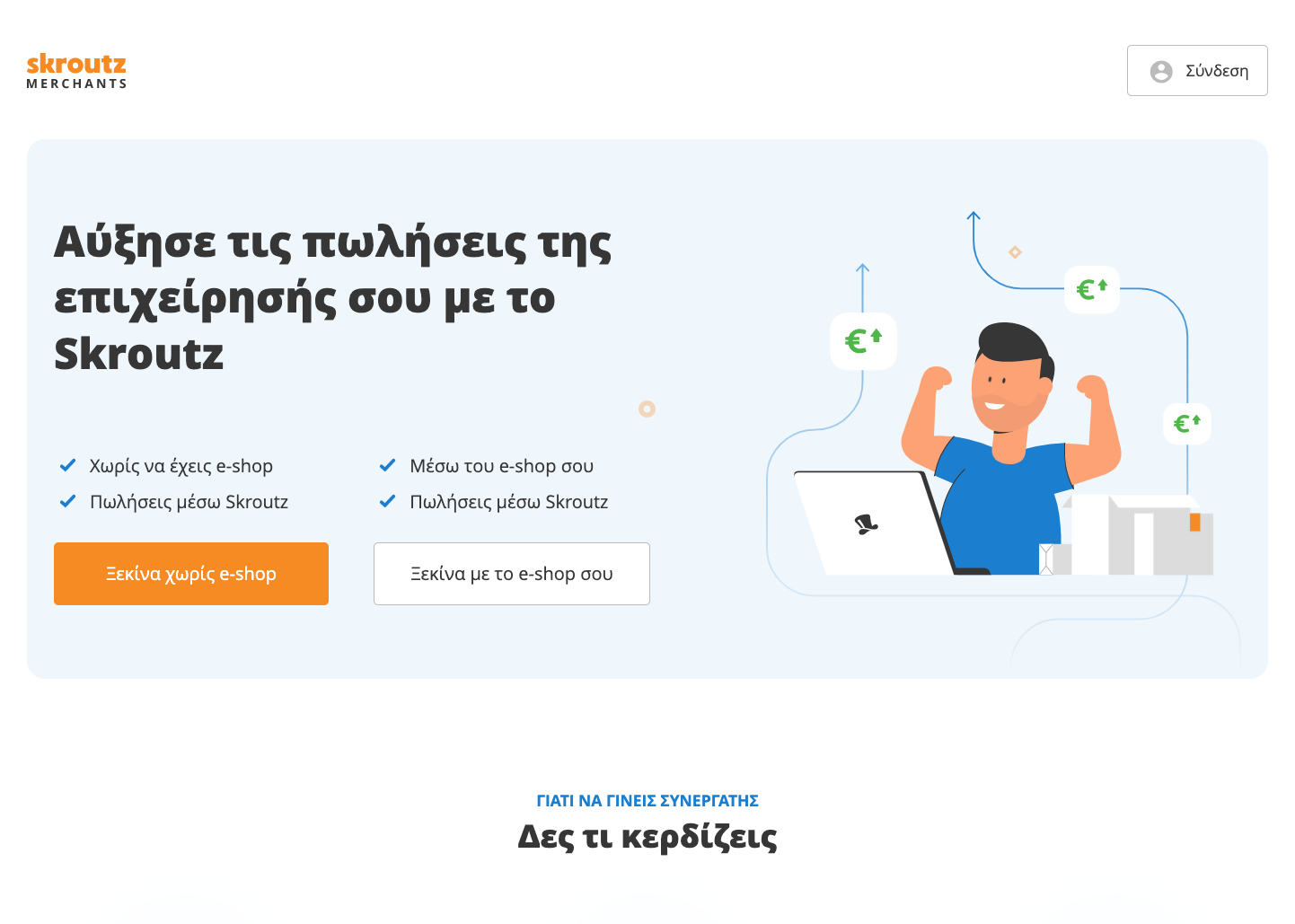
Whether relying fully on Skroutz to sell online or just using it to strengthen sales and reach prospects, Skroutz’s platform is excellent for ecommerce and business.
Booking.com, Airbnb.com - Accommodation
In tourism accommodation, Booking.com and Airbnb.com are undisputed leaders in Greece.
Image 11.11: Booking and Airbnb dominate the Greek travel and lodging market (source: aerobook.gr). \
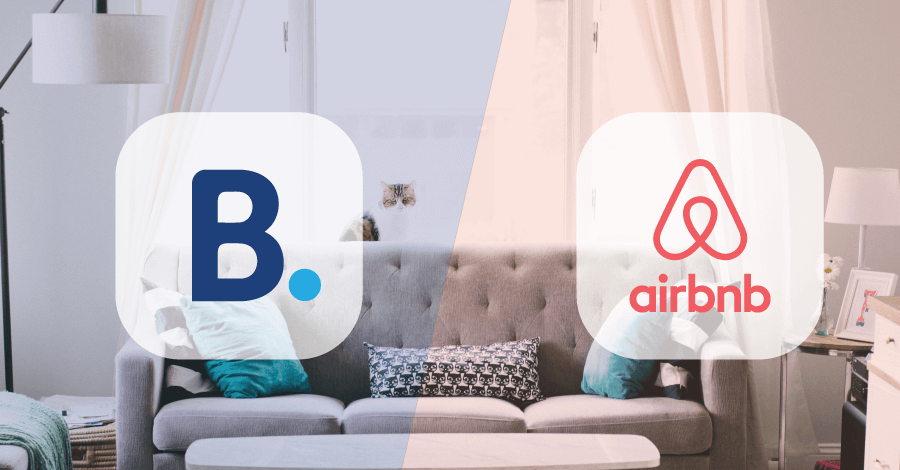
Unless a business has a very strong brand able to stand without Booking or Airbnb presence, other cases require listings on those platforms.
Even strong brands reducing dependency often keep small listings or higher prices so people see and recognize them.
Since commissions apply on bookings, someone can appear on Booking and Airbnb theoretically free, as no charge applies just to listing.
As marketing channels, both are extremely useful and can help small/new lodging businesses gain a loyal regular clientele.
Business Directories: Chrysos Odigos, Vrisko, Whitepages, etc.
When people think local directories, Chrysos Odigos, Vrisko, Whitepages, etc. come to mind.
While Google and Facebook have many uses, directories like these focus on giving users reviews of local businesses and contact info.
These directories often have excellent databases and include all sizes and types of businesses, even small ones not requesting it.
Searchers there are likely in buying mode wanting to know the best place for their money, so consider them a solution to showcase your business and offering.
Like other platforms, they also have reviews, which can be good or bad.
Excellent reviews encourage quick conversions; bad ones cause prospects to hesitate.
The above info can help you choose to invest time and give a chance to dominant platforms in your sector.
Every economic sector almost certainly has one or more major players offering platforms and services you can use for good online presence.
Always pay attention to every platform your business is listed on because you never know where customers will go for their needs.
For example, even with great Google or Facebook reviews, a bad review on Chrysos Odigos or Booking could turn away customers.
A page on a platform like Facebook or Skroutz is vital for any business. These platforms have millions or billions of active users you simply can’t ignore.
Besides lead generation, they offer a channel to engage your target audience and build meaningful relationships.
But does that mean they replace your business website?
No.
You still need a website for the reasons discussed in this chapter.
In Chapter 6 we saw the case of Secret Kitchen and Travel, a Facebook group with thousands of members interested in travel and cooking.
Today, that group has thousands of members and its owned website secretkitchenandtravel.gr has thousands of visitors.
A Google search for “secret kitchen and travel” shows the owned website and the Facebook group page as top results.
Image 11.12: Google search results for “secret kitchen and travel.” Owned site and Facebook group page are top.
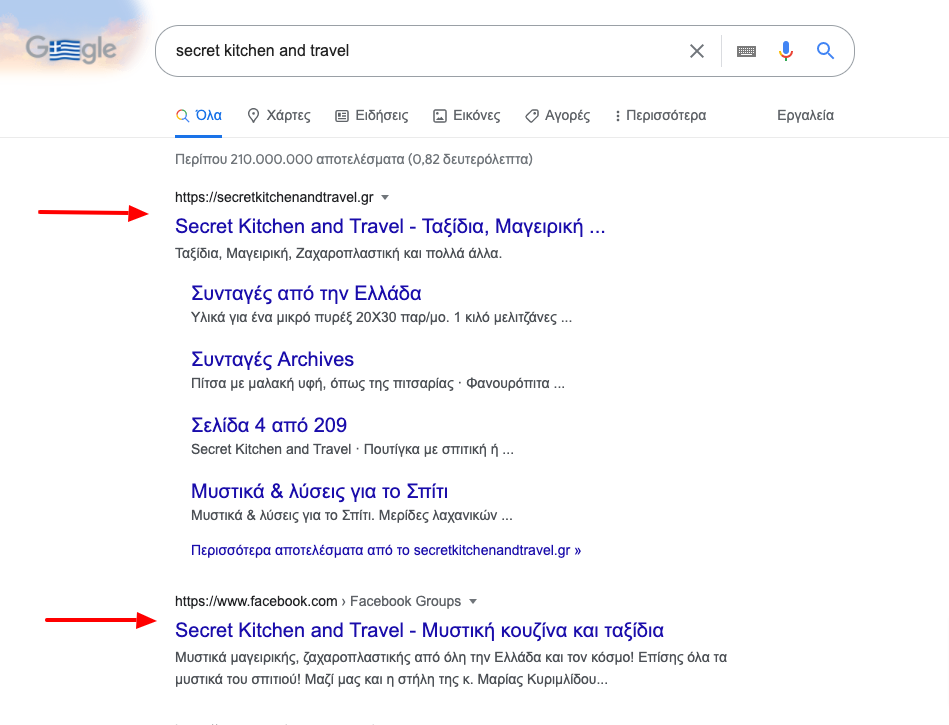
That’s the best!
So don’t put yourself in a position to choose either-or.
Your business needs both.
And since these external platforms are almost always initially free, there’s no real reason not to have both.
Things to Keep in Mind:
- While an owned website is the right answer for a professional presence, you can use an existing platform to showcase an online presence.
- The great power of popular platforms is their huge user pool.
- Be where your customers are—that’s an old maxim still true today.
Cover image source: Unsplash.com